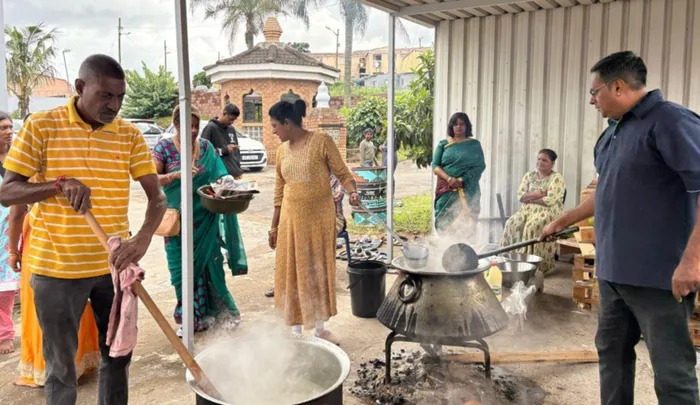
Devan Naidoo preparing sour porridge at the Chatsworth Magazine Barracks Shree Vishnu Temple.
Image: Supplied
FOOD has always been more than nourishment. For communities of faith, food is ritual, remembrance, and a sacred bond that ties generations together. Within Hindu practice, meals prepared for prayer - prasād - are not just symbolic offerings to the Divine, but also blessings for the community.
Yet, if we look closer, we discover that these dishes are also deeply beneficial for the body. Our forefathers seemed to know instinctively what modern science is only now beginning to confirm: the foods we prepare in prayer, particularly those that are fermented, are vital for our health and wellbeing. This past month, many South Indians in South Africa completed the annual Mariamman Prayer, a powerful ritual that honours the Mother Goddess.
One of the central offerings is sour porridge - fermented mielie meal prepared with devotion and served to the community. For some, this is simply tradition. But behind the prayer lies a profound truth: fermented porridge is one of the most gut-friendly foods we can consume especially when creamy maas or fermented milk is added to it. But sour porridge is not confined to the temple or the prayer mat. It has long been a staple in everyday homes, enjoyed not just by Indian families but also across African households.
Many of us grew up with it - sour porridge served with maas or plain yogurt was an affordable, nutritious, and satisfying meal. I remember coming home from school on a hot afternoon and being welcomed with a cool bowl of sour porridge and maas. It filled the stomach, refreshed the body, and somehow always lifted the spirit. Even today, this humble dish remains popular in many families, carrying both comfort and health in every spoon especially when accompanied by dry fish or Bombay duck chutney or even mixed curry.
Similarly, in South Indian homes, idli and dosa - made from fermented rice and lentils - are staples of daily life. Light on the stomach, easy to digest, and enriched by the fermentation process, these dishes provide a wealth of nutrients and natural probiotics. I can still recall the aroma of dosa batter fermenting overnight in the kitchen, bubbling gently as if alive, and then being transformed into steaming idlis in the morning.
That same scent of fermentation is part of the sensory memory of countless families. African families, too, have held onto their own treasures. The rich, tangy taste of mahewu, the traditional fermented maize drink, reminds many of their childhoods. And then there is the simple vetkoek or amagwinya - sold by Zulu women who set up stalls outside schools, factories, and bus stops. For a few cents you could buy a piping-hot vetkoek, split open and filled with mince, polony, or beans.
For Indian children, this was more than a snack; it was a cultural exchange. Buying vetkoek became part of growing up in KwaZulu-Natal. It was an everyday meeting point of black and Indian lives, where food dissolved barriers. When our forefathers arrived from India in the late 1800s as indentured labourers, they carried with them seeds, recipes, and spiritual practices from their ancestral villages.
They brought tamarind, mango pickles, rice dishes, and lentil stews. Yet they also had to adapt to the local environment. In the sugarcane plantations and rural settlements of KwaZulu-Natal, Indian families encountered African communities who had long perfected the art of cultivating and fermenting maize. It was here that the Indian palate embraced mielie meal, learning not only to use it in daily meals but also to sacralise it within ritual.
Sour porridge, once the staple of Zulu households, became woven into Hindu prayers such as Mariamman. In this way, a new ritual cuisine was born - one that honoured the Divine while reflecting the shared soil and struggles of African and Indian life in South Africa. As a researcher of Zulu and Hindu culture, I have seen first-hand how these traditions mirror one another. Both communities practise ancestor veneration, use dance and drumming in rituals, and see food as a bridge between the spiritual and the everyday.
The embrace of fermented maize porridge within Hindu ritual is not simply culinary - it is asymbol of assimilation, resilience, and cultural unity. Today, science speaks in a language our ancestors never used, but the message is the same: we are what we eat.
Fermented foods like sour porridge, idli, and dosa are rich in probiotics - the good bacteria that help balance the gut. A healthy gut does more than digest food. It strengthens the immune system, reduces inflammation, and even influences mental wellbeing. A landmark study at Stanford University recently found that people who included fermented foods in their daily diet had greater gut diversity and lower levels of inflammation.
This is not just a scientific curiosity; it has practical meaning for us in South Africa, where lifestyle diseases like diabetes, high blood pressure, and digestive disorders are on the rise. Our temple foods, once dismissed as old-fashioned, are in fact superfoods. By returning to them, we return to a healthier, more balanced way of life. In Hindu philosophy, food is considered sattvic when it is pure, balanced, and life-giving. It is prepared with care, shared with the community, and consumed with gratitude.
This approach goes beyond nutrition - it transforms eating into a spiritual act. But it also aligns with common sense. Food that is natural, plant-based, and lightly fermented supports health in ways that no pill or supplement can replicate. Our ancestors did not need the word probiotics; to understand this. They simply knew, through experience and faith, that sour porridge or fermented rice dishes made them feel better, stronger, and more resilient.
In today’s fast-paced world, where fast food outlets outnumber community kitchens, we risk losing these treasures. Young people often prefer pizza and burgers over porridge and idli. Yet the answers to many of our health problems lie not in expensive imported superfoods but in the simple recipes handed down by our mothers and grandmothers.
To reclaim these foods is to reclaim health. To prepare them in prayer is to reclaim identity. And to share them across cultural lines - Indian and African, Hindu and Christian, young and old - is to reclaim the spirit of ubuntu. Our rituals are not relics. They are living sciences of health and harmony. Every spoon of sour porridge at the Mariamman Prayer, every idli served at the family table, every bowl of mahewu brewed in an African household, every vetkoek bought from street vendors - these are more than meals.
They are reminders that food is sacred, food is medicine, and food is community. In the end, caring for the gut is not only about digestion. It is about remembering who we are: people who honour God, ancestors, and community through what we prepare and share. Perhaps the greatest wisdom our forefathers gave us is this: when we eat with devotion and with care, we heal both body and spirit.

Dr Rajendran Govender
Image: File
Dr Rajendran Govender is a Commissioner in the Cultural, Religious and Linguistic Rights Commission; Board Member of the Pan South African Language Board; Social Anthropologist and Researcher and CEO of the Tamil Business Warriors.
Related Topics: